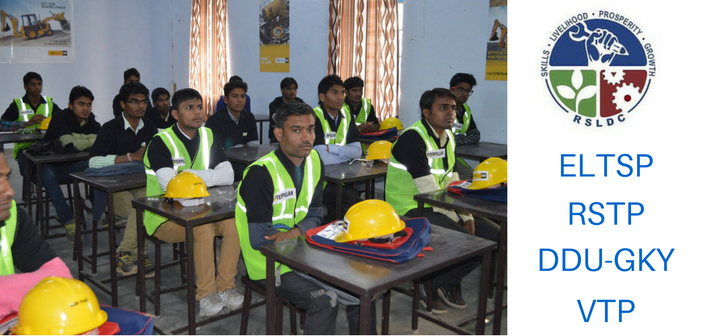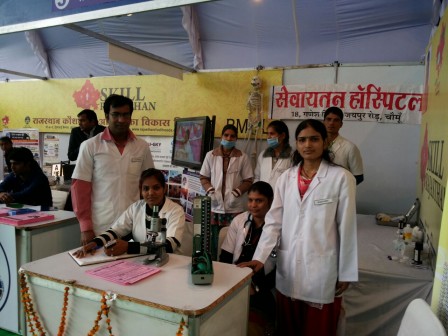Rajasthan’s livelihood mission connecting skills with jobs is fast changing the employment landscape of the state with a wide range of projects in skill development, employability and entrepreneurship. In this Skill Story, Gaurav Goyal, IAS, Managing Director*, Rajasthan Skill and Livelihood Development Corporation (RSLDC) tells us how the government is completely focused on achieving its goals with key partnerships and innovative practices.
*At the time of this interview Mr Gaurav Goyal was the MD, RSLDC; Later he was posted as the District Collector, Ajmer, Rajasthan (as per media reports).
 We follow different approaches to training through programs like Employment Linked Skill Training Program (ELSTP), Regular Skill Training Program (RSTP), DDU-GKY projects and Vocational Training Program (VTP). These programs are executed in partnership with project implementation agencies (PIAs) or training partners, the industry and the academia.
We follow different approaches to training through programs like Employment Linked Skill Training Program (ELSTP), Regular Skill Training Program (RSTP), DDU-GKY projects and Vocational Training Program (VTP). These programs are executed in partnership with project implementation agencies (PIAs) or training partners, the industry and the academia.
Short-term courses under ELSTP
This is the most popular program, of 45-90 days’ duration, targeted at school dropouts – 10th or 12th pass and unemployed graduates. In the last 2 years, we have set up 300 news skill development centers in PPP model, with a capacity to train 22,000. These centers deliver short term programs across a variety of industry sectors – construction, retail, security, banking and finance, gems and jewellery, healthcare, tourism, automotive, carpentry and so on.
We are working in more than 30 industry sectors, and most of these programs are linked with wage employment and self-employment to set up micro enterprises. So far, 1,11,000 people are trained and at present 21,000 are undergoing training. Even graduates are joining these courses as they enhance employability, show them a career path and opens up employment opportunities. Soft skills are an essential a part of the course, irrespective of their domain skills. Be it security guard, or retail executives, or masons or carpenters – in all courses, we have personality development, attitude building as mandatory components.
 Apprenticeship and Centers of Excellence at ITIs
Apprenticeship and Centers of Excellence at ITIs
With the revised Apprenticeship Act and reformed schemes, we are trying to persuade more industries to engage apprentices. So, compared to 4000 trade apprentices last year, we are planning 14,000 this year, and 1,00,000 in the next financial year.
Typical ITI programs of 1 or 2 years on Craftsman Training Scheme (CTS) are getting modernized in close association with the industry. We have created very innovative partnerships by setting up Centers of Excellence (CoE) with a number of industry leaders and multinational companies like, Cairn India, Toyota, L&T, Caterpillar, Schneider, Asian Paints, Bosch and so on. The courses will be in close collaboration with the industry needs. Since, Rajasthan is a popular tourism destination, we have set up a dedicated CoE in tourism at ITI Udaipur in collaboration with ITES Singapore.
I believe in having more options in our education system. Higher education should train youth in vocational skills and prepare them for some form of employment in the different industry sectors.
Employment exchanges
In each district, we hold a monthly Skill Employment and Education (SEE) fair, wherein at a designated place, various employers, training partners, bankers and those who help with entrepreneurship get together. This becomes a hub for counselling the youth, placing them in jobs and providing entrepreneurship loans like Prime Minister’s Mudra Yojana. Directly, it helps job seeks and indirectly it benefits several others since they become aware about various training and employment opportunities that are available, and new the options they have.

Placement of trained workforce
We don’t see this as a challenge, because, as we are able to deliver highly efficient human resources, the employers are ready to hire them. Quality builds up trust. Our youth are getting employed major companies like Future Group-Big Bazar, Dominos, Café Coffee Day, Narayana Hrudayalaya Hospital, Apollo Hospitals, Maruti and Tata Motors. In fact, when more and more skilled youth go out to the market, the employers realize, that they a big help and value addition to them, so they are keen on employing them.
The challenge is not unemployment but unemployability; there are jobs in the market, and there are youth who want to do those jobs. But somewhere there’s a disconnect. So, looking at this situation, we have started skilling programs in schools, and now we are planning for them in universities and build a skill university eventually which will offer skill oriented degree and higher education.
Assuring quality and efficiency in PPP model
For process efficiency and accountability we have take rigorous measures. In our short-term skilling program through PPP model, we do skilling through training partners who are non-government agencies, they could be for-profit or not-for-profit companies or educational institutions. We have a content monitoring mechanism, online MIS, each skill training sector is connected with our MIS, GPRS and GPS gives biometric attendance of trainees and trainers and the outcome of the scheme is that 50% youth are required to be placed. To meet the expected standards and mandatory placement, they have to hire good trainers and deliver the outcomes.
Conveying aspirational value through recognition and rewards
Incentives and rewards certainly help and motivate people to join vocational courses. More than that, personal testimonials have a better impact. For instance, in any new skill sector, when the first batch gets good placement, youth for the next batches come on their own. This word of mouth publicity will certainly generate lot of goodwill and it makes skill development aspirational. This automatically solves problems related to mobilizing people and related issues.
Our website has a Skill Calendar which makes it easy to look at all the courses and choices. To recognize meritorious achievement, we identify and reward a Skill Icon of our state every month. We also felicitate the employers, parents, training partners – they are efforts to make skill more aspirational and to have a demonstrative effect on others. And we have successfully converged most of the Government of India schemes, to create a single scheme, which has resulted in efficiencies of scale without duplication of efforts.
*At the time of this interview Mr Gaurav Goyal was the MD, RSLDC; Later he was posted as the District Collector, Ajmer, Rajasthan (as per media reports).














राजस्थान में बरसों से बंद निर्माण अकादमी को भी चालू करवाये जो कि राष्ट्रीय निर्माण अकादमी से सम्बद्ध ओर संचालित राजस्थान कौशल आजीविका निगम से ह निर्माण अकादमी की बिल्डिंग सभी 7 संभाग मुख्यालयों में ह जयपुर जोधपुर कोटा भरतपुर अजमेर बीकानेर उदयपुर
राजस्थान निर्माण अकादमी जयपुर चालू करवाओ जो कि ताले में बंद ह
Sir rsldc centre lena h jhunjhunu me process btana . Mob.no. 9460118430
Sir rsldc centre lena h poroses bataye 9660870264
Sir ,I want to open a institute under this scheme.pls provide the process
Sir I want rs-ldc institute open plz sir help me how open rsldc institute
Sir rifainary se related course Karna he please offence de
sir ye rajasthan me constrution academys open kab hogi 3 year se band h . students ke exam or karmchari berojgaar h
Am a Engineering professional with 40 years experience in Projects & Construction at Engineers india Limited and Larsen & Toubro Limited. Wish to extend Professional Consultancy services in structuring Construction Skills Training in Rebar, Form work , Masonry etc.